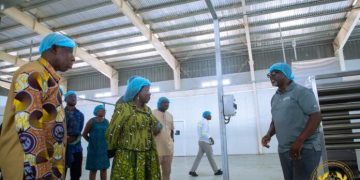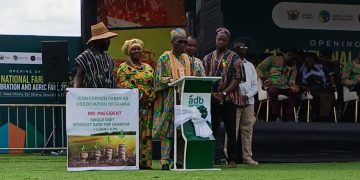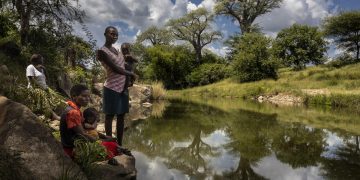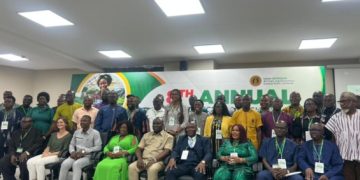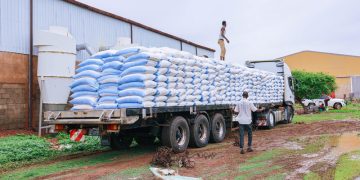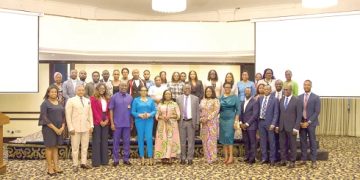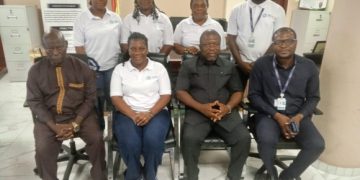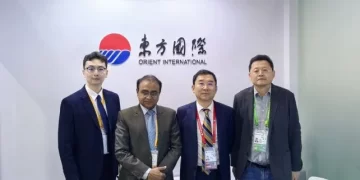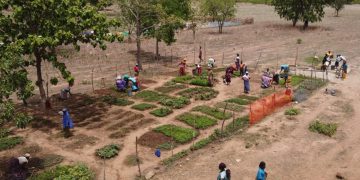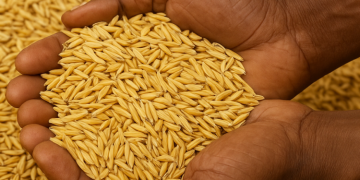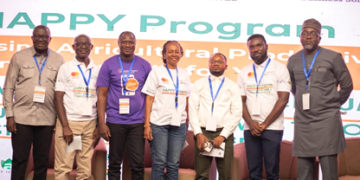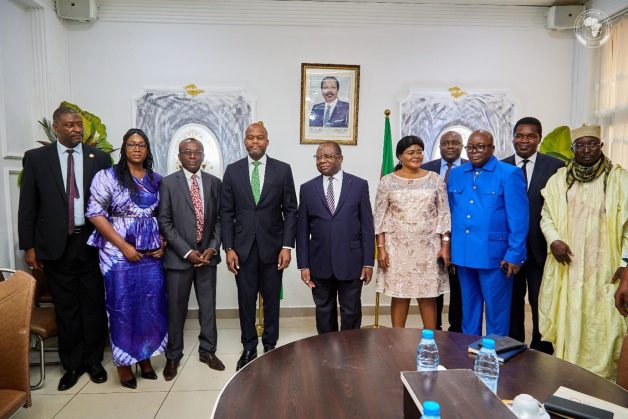Briefing the Minister of Trade of the Republic of Cameroon, H.E. Luc Magloire Mbarga Atangana on the current State of the AfCFTA during his official visit to the Republic of Cameroon, H.E. Wamkele Mene reminded Africa and Africans that recent global happenings and Trade disruptions with examples of the African Growth and Opportunities Act (AGOA) and other unjustified global trade measures of protectionism, the continent must take pragmatic steps to domesticate it’s market.
“We have to focus now in building our own domestic market and I believe that with the wisdom of Honorable Ministers and our Heads of States, we will be able to do that in a short space of time” H.E. Wamkele Mene opined.
The Secretary General assured Cameroon and the Cameroonian Business community that the African Continental Free Trade Area (AfCFTA) is laying the foundation for a single African market, unlocking unprecedented opportunities for trade, investment, and industrial growth.
“Businesses in Cameroon, across Central Africa, and throughout the continent have a key role in making the AfCFTA real, not just by trading more, but by investing in value chains, forming cross-border partnerships, and creating decent jobs,” he urged.
Since its establishment, the AfCFTA has achieved several notable milestones. To date, all but one of the 55 AU member states have signed the Agreement, and 49 have ratified it; representing 90.7% of signatories. This strong political commitment reflects the continent’s shared vision for a unified and resilient African market.
According to the AfCFTA Secretary General, Intra-African trade in value-added products, such as processed foods, textiles, and batteries, has been underway facilitated by the AfCFTA’s Guided Trade Initiative.
“These are real shipments, involving real businesses and creating real jobs. This early trade is helping to diversify our economies and empower local communities. Notably, many of these trades involve women-led SMEs and rural enterprises, showing that the AfCFTA is not only about markets; it is about inclusion”.
Secretary-General Wamkele Mene point out that, the Guided Trade Initiative having achieved its objectives has now concluded and its subsequent impact will be sustained through AfCFTA structures, and future engagement will be strengthened through the Biashara Africa Project.
“We have also made substantial progress in finalising Schedules of Specific Commitments (SSCs) across the five priority services sectors, namely, Business, Communication, Financial, Tourism, and Transport services. To date, 24 SSCs have been adopted”.
AfCFTA Secretary General urges Cameroonians to join Africa to domesticate the continent’s own market
The Secretary General of the AfCFTA Secretariat, Wamkele Mene has emphasized the need for African countries to recognize the economic opportunities that have been created within Africa to build the continent’s own domestic market.
Briefing the Minister of Trade of the Republic of Cameroon, H.E. Luc Magloire Mbarga Atangana on the current State of the AfCFTA during his official visit to the Republic of Cameroon, H.E. Wamkele Mene reminded Africa and Africans that recent global happenings and Trade disruptions with examples of the African Growth and Opportunities Act (AGOA) and other unjustified global trade measures of protectionism, the continent must take pragmatic steps to domesticate it’s market.
“We have to focus now in building our own domestic market and I believe that with the wisdom of Honorable Ministers and our Heads of States, we will be able to do that in a short space of time” H.E. Wamkele Mene opined.
The Secretary General assured Cameroon and the Cameroonian Business community that the African Continental Free Trade Area (AfCFTA) is laying the foundation for a single African market, unlocking unprecedented opportunities for trade, investment, and industrial growth.
“Businesses in Cameroon, across Central Africa, and throughout the continent have a key role in making the AfCFTA real, not just by trading more, but by investing in value chains, forming cross-border partnerships, and creating decent jobs” he urged.
Since its establishment, the AfCFTA has achieved several notable milestones. To date, all but one of the 55 AU member states have signed the Agreement, and 49 have ratified it; representing 90.7% of signatories. This strong political commitment reflects the continent’s shared vision for a unified and resilient African market.
According to the AfCFTA Secretary General, Intra-African trade in value-added products, such as processed foods, textiles, and batteries, has been underway facilitated by the AfCFTA’s Guided Trade Initiative.
“These are real shipments, involving real businesses and creating real jobs. This early trade is helping to diversify our economies and empower local communities. Notably, many of these trades involve women-led SMEs and rural enterprises, showing that the AfCFTA is not only about markets; it is about inclusion”.
Secretary-General Wamkele Mene point out that, the Guided Trade Initiative having achieved its objectives has now concluded and its subsequent impact will be sustained through AfCFTA structures, and future engagement will be strengthened through the Biashara Africa Project.
“We have also made substantial progress in finalising Schedules of Specific Commitments (SSCs) across the five priority services sectors, namely, Business, Communication, Financial, Tourism, and Transport services. To date, 24 SSCs have been adopted”.
AfCFTA Secretary General urges Cameroonians to join Africa to domesticate the continent’s own market
The Secretary General of the AfCFTA Secretariat, Wamkele Mene has emphasized the need for African countries to recognize the economic opportunities that have been created within Africa to build the continent’s own domestic market.
Briefing the Minister of Trade of the Republic of Cameroon, H.E. Luc Magloire Mbarga Atangana on the current State of the AfCFTA during his official visit to the Republic of Cameroon, H.E. Wamkele Mene reminded Africa and Africans that recent global happenings and Trade disruptions with examples of the African Growth and Opportunities Act (AGOA) and other unjustified global trade measures of protectionism, the continent must take pragmatic steps to domesticate it’s market.
“We have to focus now in building our own domestic market and I believe that with the wisdom of Honorable Ministers and our Heads of States, we will be able to do that in a short space of time” H.E. Wamkele Mene opined.
The Secretary General assured Cameroon and the Cameroonian Business community that the African Continental Free Trade Area (AfCFTA) is laying the foundation for a single African market, unlocking unprecedented opportunities for trade, investment, and industrial growth.
“Businesses in Cameroon, across Central Africa, and throughout the continent have a key role in making the AfCFTA real, not just by trading more, but by investing in value chains, forming cross-border partnerships, and creating decent jobs,” he urged.
Since its establishment, the AfCFTA has achieved several notable milestones. To date, all but one of the 55 AU member states have signed the Agreement, and 49 have ratified it; representing 90.7% of signatories. This strong political commitment reflects the continent’s shared vision for a unified and resilient African market.
According to the AfCFTA Secretary General, Intra-African trade in value-added products, such as processed foods, textiles, and batteries, has been underway facilitated by the AfCFTA’s Guided Trade Initiative.
“These are real shipments, involving real businesses and creating real jobs. This early trade is helping to diversify our economies and empower local communities. Notably, many of these trades involve women-led SMEs and rural enterprises, showing that the AfCFTA is not only about markets; it is about inclusion”.
Secretary-General Wamkele Mene point out that, the Guided Trade Initiative having achieved its objectives has now concluded and its subsequent impact will be sustained through AfCFTA structures, and future engagement will be strengthened through the Biashara Africa Project.
“We have also made substantial progress in finalising Schedules of Specific Commitments (SSCs) across the five priority services sectors, namely, Business, Communication, Financial, Tourism, and Transport services. To date, 24 SSCs have been adopted”.









